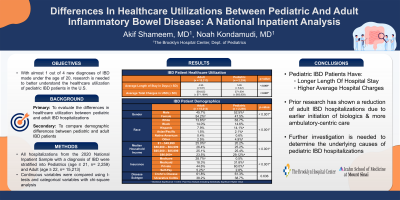Sunday Poster Session
Category: Pediatrics
P1462 - Differences in Healthcare Utilizations Between Pediatric and Adult Inflammatory Bowel Disease: A National Inpatient Analysis
Sunday, October 27, 2024
3:30 PM - 7:00 PM ET
Location: Exhibit Hall E

Has Audio

Akif Shameem, MD
The Brooklyn Hospital Center
Brooklyn, NY
Presenting Author(s)
Award: Presidential Poster Award
Akif Shameem, MD, Noah Kondamudi, MD
The Brooklyn Hospital Center, Brooklyn, NY
Introduction: In the United States, the rates of pediatric IBD have more than doubled from 33 per 100,000 to 77 per 100,000 between 2007 and 2016 respectively. With almost 1 out of 4 new diagnoses of IBD made under the age of 20, research is needed to better understand the healthcare utilization of pediatric IBD patients in the U.S.
OBJECTIVE:
Primary:To evaluate the differences in healthcare utilization between pediatric and adult IBD patients
Secondary: To compare demographic differences between pediatric and adult IBD patients
Methods: Our retrospective cohort study analyzed all hospitalizations with a primary discharge diagnosis of IBD (including Crohn’s Disease and Ulcerative Colitis) from the 2020 National Inpatient Sample (NIS), the largest U.S. database of inpatient hospital stays. Hospital encounters were stratified into Pediatrics (≤ 21) and Adult (≥ 22) and continuous variables were compared using T-Test and categorical variables with Chi-Square Analysis. Post hoc analysis with Bonferroni correction was utilized to determine further statistical differences between categories.
Results: Our study included a total of 17,472 IBD discharges. There were 15,213 adult IBD hospitalizations with an average age of 48.20 years with the majority being white and female. There were 2,259 pediatric IBD hospitalizations with an average age of 16.02 years with the majority being white and male. Post hoc analysis demonstrated pediatric IBD patients comprised of statistically more males, Hispanics, Asians, having household incomes over $86,000+, private insurance payers, and residing in larger cities.
Adult IBD patients had an average length of stay was 4.95 ± 5.61 days with an average total charge of $54,622. Pediatric IBD patients had a statistically longer length of stay 5.85 ± 6.42 days (p< 0.001) and a higher average total charge of $71,604 (p< 0.001) compared to adult IBD patients.
Discussion: Our results demonstrate that hospitalized pediatric IBD patients have a longer length of stay and higher hospital charges compared to adult IBD patients. This aligns with previous research demonstrating pediatric-onset IBD having more extensive bowel involvement, higher rates of surgery, and higher risks of relapse. Studies have also shown that adult IBD hospitalizations have decreased over the last two decades due to the transition to more ambulatory-centric IBD care. Therefore, more robust pediatric outpatient IBD care is needed to reduce inpatient healthcare costs of pediatric inflammatory bowel disease.
Note: The table for this abstract can be viewed in the ePoster Gallery section of the ACG 2024 ePoster Site or in The American Journal of Gastroenterology's abstract supplement issue, both of which will be available starting October 27, 2024.
Disclosures:
Akif Shameem, MD, Noah Kondamudi, MD. P1462 - Differences in Healthcare Utilizations Between Pediatric and Adult Inflammatory Bowel Disease: A National Inpatient Analysis, ACG 2024 Annual Scientific Meeting Abstracts. Philadelphia, PA: American College of Gastroenterology.
Akif Shameem, MD, Noah Kondamudi, MD
The Brooklyn Hospital Center, Brooklyn, NY
Introduction: In the United States, the rates of pediatric IBD have more than doubled from 33 per 100,000 to 77 per 100,000 between 2007 and 2016 respectively. With almost 1 out of 4 new diagnoses of IBD made under the age of 20, research is needed to better understand the healthcare utilization of pediatric IBD patients in the U.S.
OBJECTIVE:
Primary:To evaluate the differences in healthcare utilization between pediatric and adult IBD patients
Secondary: To compare demographic differences between pediatric and adult IBD patients
Methods: Our retrospective cohort study analyzed all hospitalizations with a primary discharge diagnosis of IBD (including Crohn’s Disease and Ulcerative Colitis) from the 2020 National Inpatient Sample (NIS), the largest U.S. database of inpatient hospital stays. Hospital encounters were stratified into Pediatrics (≤ 21) and Adult (≥ 22) and continuous variables were compared using T-Test and categorical variables with Chi-Square Analysis. Post hoc analysis with Bonferroni correction was utilized to determine further statistical differences between categories.
Results: Our study included a total of 17,472 IBD discharges. There were 15,213 adult IBD hospitalizations with an average age of 48.20 years with the majority being white and female. There were 2,259 pediatric IBD hospitalizations with an average age of 16.02 years with the majority being white and male. Post hoc analysis demonstrated pediatric IBD patients comprised of statistically more males, Hispanics, Asians, having household incomes over $86,000+, private insurance payers, and residing in larger cities.
Adult IBD patients had an average length of stay was 4.95 ± 5.61 days with an average total charge of $54,622. Pediatric IBD patients had a statistically longer length of stay 5.85 ± 6.42 days (p< 0.001) and a higher average total charge of $71,604 (p< 0.001) compared to adult IBD patients.
Discussion: Our results demonstrate that hospitalized pediatric IBD patients have a longer length of stay and higher hospital charges compared to adult IBD patients. This aligns with previous research demonstrating pediatric-onset IBD having more extensive bowel involvement, higher rates of surgery, and higher risks of relapse. Studies have also shown that adult IBD hospitalizations have decreased over the last two decades due to the transition to more ambulatory-centric IBD care. Therefore, more robust pediatric outpatient IBD care is needed to reduce inpatient healthcare costs of pediatric inflammatory bowel disease.
Note: The table for this abstract can be viewed in the ePoster Gallery section of the ACG 2024 ePoster Site or in The American Journal of Gastroenterology's abstract supplement issue, both of which will be available starting October 27, 2024.
Disclosures:
Akif Shameem indicated no relevant financial relationships.
Noah Kondamudi indicated no relevant financial relationships.
Akif Shameem, MD, Noah Kondamudi, MD. P1462 - Differences in Healthcare Utilizations Between Pediatric and Adult Inflammatory Bowel Disease: A National Inpatient Analysis, ACG 2024 Annual Scientific Meeting Abstracts. Philadelphia, PA: American College of Gastroenterology.

